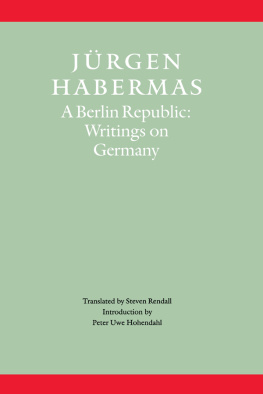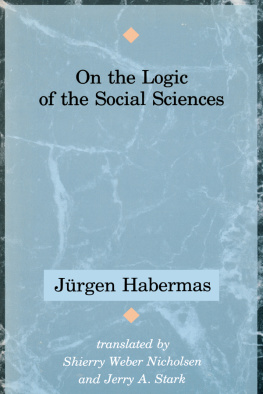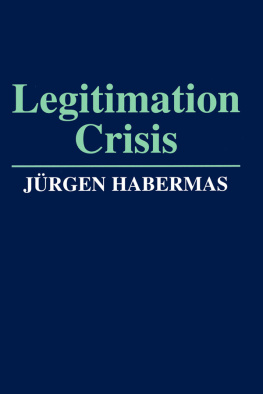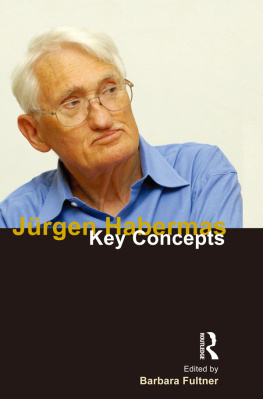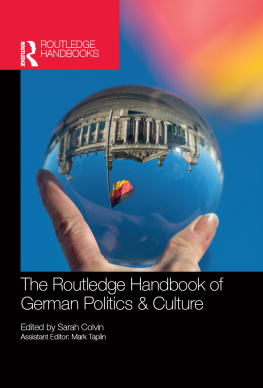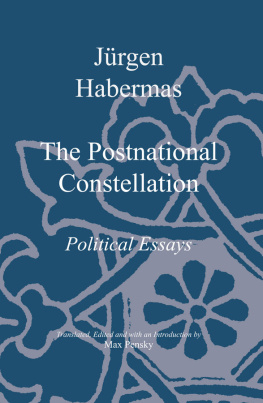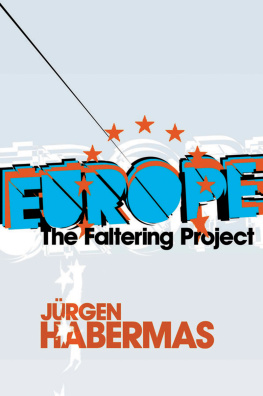Habermas Jürgen - A Berlin Republic Writings on Germany
Here you can read online Habermas Jürgen - A Berlin Republic Writings on Germany full text of the book (entire story) in english for free. Download pdf and epub, get meaning, cover and reviews about this ebook. City: New York;NY, year: 2015;2014, publisher: Polity Press&John Wiley & Sons, genre: Politics. Description of the work, (preface) as well as reviews are available. Best literature library LitArk.com created for fans of good reading and offers a wide selection of genres:
Romance novel
Science fiction
Adventure
Detective
Science
History
Home and family
Prose
Art
Politics
Computer
Non-fiction
Religion
Business
Children
Humor
Choose a favorite category and find really read worthwhile books. Enjoy immersion in the world of imagination, feel the emotions of the characters or learn something new for yourself, make an fascinating discovery.
- Book:A Berlin Republic Writings on Germany
- Author:
- Publisher:Polity Press&John Wiley & Sons
- Genre:
- Year:2015;2014
- City:New York;NY
- Rating:4 / 5
- Favourites:Add to favourites
- Your mark:
- 80
- 1
- 2
- 3
- 4
- 5
A Berlin Republic Writings on Germany: summary, description and annotation
We offer to read an annotation, description, summary or preface (depends on what the author of the book "A Berlin Republic Writings on Germany" wrote himself). If you haven't found the necessary information about the book — write in the comments, we will try to find it.
A Berlin Republic Writings on Germany — read online for free the complete book (whole text) full work
Below is the text of the book, divided by pages. System saving the place of the last page read, allows you to conveniently read the book "A Berlin Republic Writings on Germany" online for free, without having to search again every time where you left off. Put a bookmark, and you can go to the page where you finished reading at any time.
Font size:
Interval:
Bookmark:

Contents

English translation and introduction University of Nebraska Press
1997. First published as Die Normalitt einer Berliner Republik,
Suhrkamp Verlag, Frankfurt am Main, 1995.
First published in England 1998 by Polity Press in association with
Blackwell Publishers Ltd.
Published with the assistance of Inter Nationes, Bonn.
Editorial office:
Polity Press
65 Bridge Street
Cambridge CB2 1UR, UK
Marketing and production:
Blackwell Publishers Ltd.
108 Cowley Road
Oxford OX4 1JF, UK
All rights reserved. Except for the quotation of short passages for the purposes of criticism and review, no part of this publication may be reproduced, stored in a retrieval system, or transmitted in any form or by any means, electronic, mechanical, photocopying, recording or otherwise, without the prior permission of the publisher.
This book is sold subject to the condition that it shall not, by way of trade or otherwise, be lent, re-sold, hired out, or otherwise circulated without the publishers prior consent in any form of binding or cover other than that in which it is published and without a similar condition including this condition being imposed on the subsequent purchaser.
ISBN 0-7456-2044-2
ISBN 0-7456-2045-0 (pbk)
Introduction by Peter Uwe Hohendahl
THE SERIES OF ESSAYS, articles, and interviews collected in this volume reflects a side of Jrgen Habermass work that is less known in the United States than his major theoretical texts, beginning with Knowledge and Human Interest (1971) and leading up to The Theory of Communicative Action (1984). They demonstrate the authors ongoing involvement in the German and European public sphere. More specifically, they are the interventions of a passionate public intellectual, who has always felt that his academic appointment at the University of Frankfurt could not be the only platform from which to respond to the questions of the day. The recent discovery of Habermass early work in the English-speaking world, in particular the publication of The Structural Transformation of the Public Sphere in 1989 (the first German edition appeared in 1962), provides perhaps a more suitable frame for an appreciation of the rhetoric of these essays than his theoretically more abstract later writings, as much as they exhibit, although in different forms, their authors strong commitment to the idea of political praxis. Habermass concept of the public sphere, a space where private persons come together to develop a critical discourse that aims at a rational consensus in matters of culture and politics, still guides the thrust of Habermass essays from the early 1990s. Although he moved away from the specific historical arguments of Structural Transformation during the 1970s and later completely abandoned the theoretical framework of his first major book, Habermas holds on to the conception of the public sphere as a realm that is not occupied by symbolic media; a realm, in other words, where citizens through the form of rational discussion find the resources to resist the pressure and the intrusion of the state and the economy. In the terminology of Habermass later work, the public sphere is an essential part of the lifeworld in which people interact and make sense of their lives.
In the new introduction to the 1990 German edition of Structural Transformation (available in English as Further Reflections on the Public Sphere) Habermas insists again on the need for a vibrant and open public sphere but also on the need for a new and different theoretical grounding. I suggested, therefore, that the normative foundations of the critical theory of society be laid at a deeper level. The theory of communicative action intends to bring into the open the rational potential intrinsic in everyday communicative practices. The part of his early theory he now rejects is the assumption that modern society can be conceived as a large association in which the associated individuals can participate like the members of an encompassing organization. Such an assumption is no longer plausible in a highly complex, functionally differentiated society. Thus Habermas sees the role of the public sphere and that of the intellectual operating within this space in a more pragmatic light than in the 1960s when the Utopian element of his theory was decidedly stronger. Whereas the early Habermas hoped for a radical democracy that would reconstruct both the forms and the means of political communication that had led to the decline of the bourgeois public sphere, the Habermas of the 1990s focuses on the moral and legal issues involved in the making of a democratic society Hence, in his role as a public intellectual he is particularly concerned with questions of political culture and broader issues of historical traditions that transcend the level of conventional party politics. In the revised definition of his task, he foregrounds a moment that was already part of his early theory political discourse is understood as a form of communication that is not exclusively defined in terms of interests.
As suggested above, Habermas holds on to the ideas of a radical democracy in which the citizens are encouraged to participate in the policy- and decision-making process. Although the state and its various administrative organizations are acknowledged as necessary media of power, they are also viewed as potential threats to democracy. In this respect Habermas stands in sharp contrast to neoconservative intellectuals in Germany, who were influenced by the teachings of Carl Schmitt after 1945 (although Schmitt was not allowed to return to his university post). Schmitt, who had been a crucial political theorist in favor of the takeover by the National Socialists in 1933, continued to have, as Habermas points out in Carl Schmitt in the Political Intellectual History of the Federal Republic, a significant impact on West Germanys intellectual life through private circles and devoted followers, many of whom later ended up in important public positions. For the position of the neocon-servatives, the centrality of the state remains unquestioned.
Against this interpretation of the German tradition Habermas wants to foreground the popular and democratic elements of the German past. Yet Habermass idea of a radical democracy has to be distinguished from two competing versions of political practice; namely, the tradition of communal democracy (Rousseau) on the one hand and state Socialism on the other. Already, in Structural Transformation, Habermas had opted for a Kantian reading of the public sphere rather than a populist definition la Rousseau in which rational deliberation among the citizens as a mode of reaching consensus is played down. Habermass emphasis on solidarity does not mean a democracy of the heart. More important in the contemporary debate, however, is his opposition to the model of state Socialism, which Habermas encountered in East Germany. Unlike other members of the Left in West Germany, Habermas never showed any sympathy for the version of democratic centralism practiced in East Berlin. Its method of state and party control clearly clashed with Habermass notion of a democratic process from below based on the deliberations of the citizens. In 1962, Habermas had criticized the lack of a vital political culture in contemporary Western democracies (using primarily American data). He noted a growing fusion of state and parliament, a process that resulted in political decisions based on compromise rather than rational debate. But although Habermas has continued to be a critical observer of parliamentary democracy, he has never suggested or argued for a fundamental change of the West German (now German) constitution. In other words, his notion of radical democracy has been grounded in the liberal tradition that he found in Western Europe and the United States. In his essays, Habermas again and again highlights the historical moment of 1945 as the crucial turning point in German history, when West Germanys political culture took in the ideas of the European Enlightenment. This is precisely the point where he disagrees with Christa Wolfs reading of 1989 in which she emphasized the need to return to the roots of German culture both in the East and in the West. Habermas clearly does not trust an unqualified use of the concept of the German tradition as it has increasingly resurfaced in Germany after 1989.
Next pageFont size:
Interval:
Bookmark:
Similar books «A Berlin Republic Writings on Germany»
Look at similar books to A Berlin Republic Writings on Germany. We have selected literature similar in name and meaning in the hope of providing readers with more options to find new, interesting, not yet read works.
Discussion, reviews of the book A Berlin Republic Writings on Germany and just readers' own opinions. Leave your comments, write what you think about the work, its meaning or the main characters. Specify what exactly you liked and what you didn't like, and why you think so.

